- The Union government has adopted a programme to promote India as a manufacturing hub for electric vehicles.
Features of the Electric Vehicle Policy:
- Import Duty Reduction: For the next five years, import duty on electric vehicles (EVs) imported as Completely Built Units (CBUs) with a minimum CIF value of $35,000 will be decreased from 70%-100% to 15%.
- Waive of Duty: To import 40,000 electric vehicles in five years with a tax waiver of ₹6,484 crore or proportionate to investment (whichever is lower), a minimum investment of $800 million is required.
- Localization Targets: Manufacturers must establish manufacturing facilities in India within three years. They must accomplish 25% localization by the third year, and 50% by the fifth year of incentivized operation.
- Incentives for Establishing Manufacturing Facilities: The programme encourages enterprises to develop manufacturing facilities in India by granting lower import levies and exemptions if they satisfy specific investment and localization criteria.
- Encouragement of Global EV producers: The strategy intends to attract global EV producers such as Tesla and Chinese EV maker BYD to enter the Indian market by offering favourable terms for establishing manufacturing facilities and importing EVs.
Present issues highlighted by private market players:
- Impact on indigenous sector: Tata Motors opposed the cut in import taxes, saying that it would harm the indigenous sector. They said that cutting tariffs would hurt the investment climate.
- Domestic firms are worried that the regulation primarily advantages higher-end Original Equipment Manufacturers (OEMs), potentially putting them at a competitive disadvantage in segments under ₹29 lakh.
- Favouring Global Players: The strategy looks to favour global EV players and Indian joint ventures with them, potentially making it more difficult for domestic players to compete successfully.
Conclusion:
The government should engage in communication with stakeholders, especially local players like Tata Motors, to address their concerns and solicit their advice on policy formulation. Domestic players must be supported through measures such as incentives and assistance for technological development, innovation, and capacity building.
Source: https://www.livemint.com/news/india/ev-industry-in-india-how-india-accelerates-towards-becoming-next-powerhouse-in-ev-production-11688005217114.html

